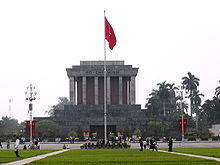Should I travel to America, and become flimsy, and ordinary, like those who are satisfied with idle talk and sleep. Or should I distinguish myself with values and spirit. Is there other than Islam that I should be steadfast to in its character and hold on to its instructions, in this life amidst deviant chaos, and the endless means of satisfying animalistic desires, pleasures, and awful sins? I wanted to be the latter man. Sayyid Qutb
You have probably never heard of Sayyid Qutb, the godfather of radical Islam. In a way, this fact is enough to understand why the U.S. repeatedly screws up in the Middle East.
Is there a single success story? Is there a single example of a U.S. policy in the Middle East that has led to peace, prosperity, economic development, and stability, among any of the Arab states, or Iran, or Africa? Is there a single American who knows who Sayyid Qutb is?
You don’t know and you don’t care? Then stay the hell out of Middle Eastern politics. You can only make things worse.
The point is not that understanding Qutb will help you understand what the solutions are to the problems in Egypt or Iraq or Afghanistan or Syria. The point is that if you don’t even know who Qutb is, you have no business even trying to understand the rest of the dynamics at play.
Sayyid Qutb is a seminal Islamic writer and theorist who briefly visited the U.S. in the 1940’s and was absolutely appalled at what he saw. Essentially, he was revolted by people enjoying prosperity and society and culture and their bodies. He found America vulgar and violent and “animalistic”. He ravishingly describes American girls as being experts in seduction.
Qutb decided that the Arab Islamic world must be spared this horrible descent into pleasure and so he returned to Egypt where he joined the Muslim Brotherhood and wrote books and edited journals and befriended a military officer named Gamal Abdel Nasser. When Nasser overthrew King Farouk in July 1952 and installed a loyalist, Muhammad Naguib, as president, Qutb thought the Islamic Republic was at hand. He and Nasser would talk and talk and talk, sometimes, up to 12 hours without interruption.
As part of an agreement with the U.S. and Britain, King Farouk was politely exiled and the monarchy abolished.
Nasser begged Qutb to join the new government, in any capacity he wished, but Qutb sensed that Nasser was not a good Islamicist and wasn’t serious about imposing an Islamic state on Egypt making sure that Arabic women lived their lives peering through slitted hoods.
In October, 1954, Qutb, bitterly disappointed that Nasser appeared to be heading towards a secular, socialist state, joined at least six other Moslem Brotherhood members in an attempted coup, which included the attempted assassination of Nasser on the 26th, while he was giving a speech in Alexandria. Mohammed Abdel Latif fired eight shots at Nasser, from less than 8 meters away, and missed with all of them. Nasser remained calm and continued speaking, and had an Evita moment: Egypt c’est moi. Then he cracked down on the opposition. Qutb was eventually hanged. But he was right about Nasser: in 1957, he extended suffrage to women, prohibited discrimination based on gender, and implemented special protections for women in the workplace.
The American girl is well acquainted with her body’s seductive capacity. She knows it lies in the face, and in expressive eyes, and thirsty lips. She knows seductiveness lies in the round breasts, the full buttocks, and in the shapely thighs, sleek legs—and she shows all this and does not hide it. Sayyid Qutb
Qutb sounds like he is mentally ravishing those American girls.
There it is, in extreme abstraction: Egypt, coups, Islam, army, protests, the whole ball of wax, Middle Eastern history to 2013. Nasser, by the way, was “incorruptible”. That explains why the Western powers and their allies wanted to assassinate him too! Seriously, think about it– why the hell were the Western powers, all through the 60’s, 70’s, and ’80’s, so eager to overthrow leftist governments and install corrupt assholes like the Shah of Iran, Somoza in Nicaragua, Pinochet in Chile? How has all that worked out?
Think about the fact that America joined the Islamic Brotherhood in wanting to assassinate Nasser! Is the enemy of my enemy, in this case, my friend?
What nobody ever admits, of course, is that the first purpose of power everywhere, every time, is to take wealth away from people who earned it and hand it over to people who have acquired power and privilege, always– always– at the barrel of a gun. If not the titular leader, then the party that keeps him in power: the military officers, the cabinet officials, the corporate executives, the weapons makers, the killers, the oil companies, the phosphate companies, the rubber companies, the coffee companies, and so on and so on and so on.
Some notes about Nasser, Egypt, Syria, and the Whole Mess
The U.S. should study July 1956: Nasser announced that he was “nationalizing” the Suez Canal. The canal, built with Egyptian labour and British money, and owned and run by the British on Egyptian soil, was central to Egypt’s perception of it’s role in the world and it’s standing among the great powers. Nothing Nasser ever did, before or after, generated such broad, passionate support as this single act. It was so decisively supported by everyone in Egypt that even Britain could not resist.
Could not… but they did. In October 1956, together with France and Israel, they plotted to seize the canal back and occupy Egyptian territory adjacent to it. And they agreed to overthrow Nasser. This became known as the “Suez Crisis”. France, Britain and Israel quickly brushed aside the weak Egyptian army and occupied the canal zone, while Nasser ordered ships sunk in the canal to block it’s use. Some of Nasser’s own advisors were urging him to surrender to the British.
And here something remarkable happened. The United States, under President Eisenhower, and supported by the U.N., demanded that the British, French and Israelis withdraw.
And they did. By April, 1957 the canal was re-opened under Egyptian control.
After their wedding, the couple moved into a house in Manshiyat al-Bakri, a suburb of Cairo, where they would live for the rest of their lives. Nasser’s entry into the officer corps in 1937 secured him relatively well-paid employment in a society where most people lived in poverty. His social status was still well below the wealthy Egyptian elite, and his resentment of those born into wealth and power continued to grow. Wikipedia
In 1957, Egypt’s only ally was– wait for it– Syria! Syria had a leftist government which Eisenhower and other Western powers were eager to topple. King Saud of Saudi Arabia tried to have Nasser assassinated. You couldn’t make this shit up.
The first, most pertinent fact about Egypt today is that the army controls the means of production, the corporations, the infrastructure that generates wealth. All the speeches about democracy and freedom and stability and so on is just so much bullshit. The longer one is in power, the more elaborate, sophisticated, and oblique the relationship seems– Kings are crowned, monuments are erected, spectacles organized– but the fundamental is always the same: he who has the gold makes the rules and he who rules gets the gold.
Qutb did not, as some assert, lay down the groundwork for an Islamic war upon America and the West. He laid the groundwork for the real dynamic in the Middle East today: the war between Sunni and Shia, Alawite, fundamentalist, warlords, Kurds, and secularists. The war between what he saw as true Islam and the heretics. The war in Syria is not between a dictator and the democratic will of the people: it is between two, maybe three sects of Islam, and they will never, in our lifetime, learn to share power or to live in a pluralistic state.
If the U.S. arms the rebels, they will murder the Alawites and then they will turn on each other.




